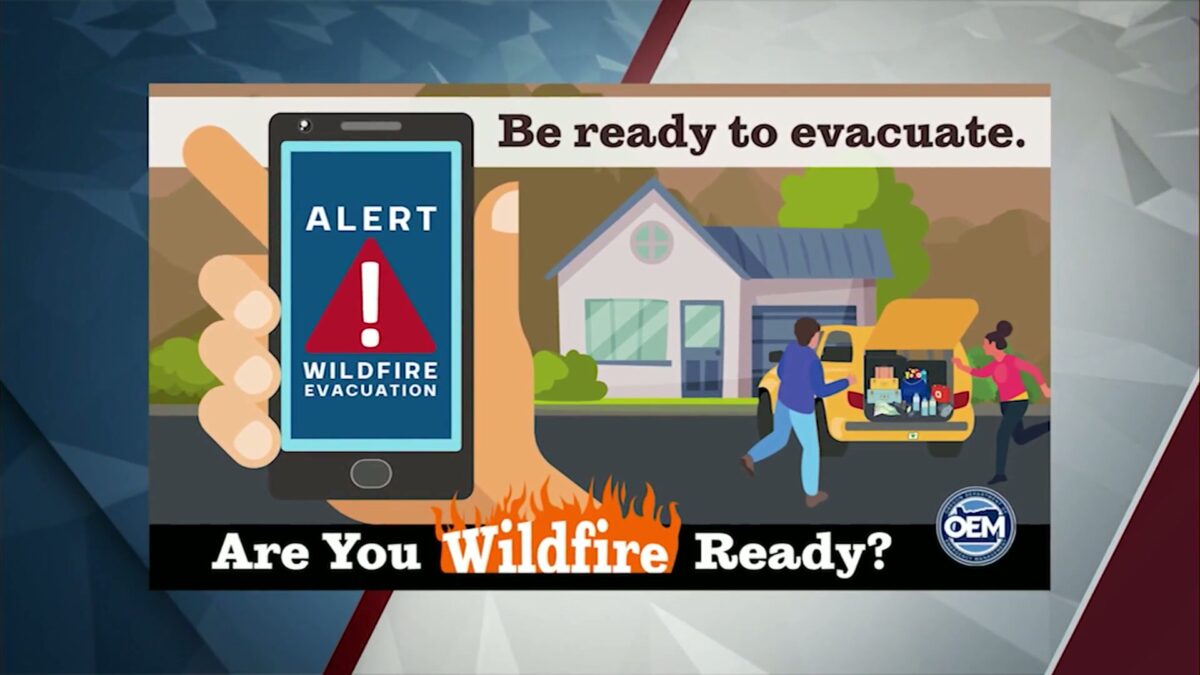Wildfire season begins in Central Oregon: what you need to know to prepare

Claire Elmer
(Update: Adding video, full story, interviews, and resources)
BEND, Ore. (KTVZ) — Tuesday’s Euston fire in Redmond triggered evacuation alerts and cut power to approximately 10,000 homes and businesses.
Though quickly contained, it was a reminder to be emergency-ready
The first critical step – ensuring you are notified as soon as you are at risk.
Lt. Nathan Garibay, emergency services manager for Deschutes County Sheriff’s Office told KTVZ, “We encourage people to sign up for Deschutes Alerts which allows you to put in a number of different contact options – your address of your home and your work.”
Deschutes Alerts will directly inform you of an emergency that may affect you – via call, text, or email. You can sign up for the alert system here.
Even if you currently receive the alerts, regularly check your profile to confirm your information is accurate. It will increase the ability of making sure officials can reach you during an emergency.
There are three levels for evacuation alerts –
Level One – be ready
Level Two – be set
Level Three – go now!
Levels can change at any moment, and preparation will help you act quickly.
We spoke with an estate attorney, Patricia Nelson, owner and attorney at Two Spruce Law PC, about critical documents you need to grab.
Nelson told KTVZ, “If you have originals, protect them: Birth certificates, death certificates, marriage certificates, social security cards, wills, trusts, advanced directives, and insurance policy information.”
Another important reminder – take things invaluable to you, leave the rest. Anything insured can be replaced. Taking inventory of your possessions beforehand is key.
“Take a quick video of each drawer, the contents of each drawer. Flip through so that you have evidence of what you had. If you have something particularly valuable a boat, an RV and piece of art…if you can, retain the receipts for the purchase,” recommended Nelson.
Other things to help you prepare – a family emergency plan that includes health and contact information, a go-bag – at your home, car, or even workplace, and a list of things to do before leaving your home.
You can fill out an emergency plan online here and have it emailed as a PDF to your loved ones to ensure all information is current and accurate.
Ask the following questions to make sure you are adequately prepared:
Are you set up to receive emergency alerts?
Check your information to make sure it’s up to date. Text COFIRE to 888-777 for fire-specific information.
What is your shelter plan?
If you need shelter assistance, you can call the American Red Cross 1-800-733-2767 (800-Red-Cross) or find local resources by dialing 211 or texting your zip code to 898-211 (help will reply between 9am-5pm).
What is your evacuation route?
Check your routes on TripCheck or call 511 for road closure info.
What is my family communication plan?
Confirm contact information is up-to-date, where you’ll meet, and how you’ll stay connected in the event of an emergency.
Do you need to update your emergency kit?
Regularly check your go-bag or emergency kit to ensure adequate supplies and expiration dates (where applicable).
When preparing to evacuate, remember the six P’s:
People and pets (food, water, hygiene, sanitation, clothing and comfort items).
Prescriptions (medications, eyeglasses and medical devices).
Phones, personal computers, hard drives or disks, and chargers.
“Plastic” (ATM debit and credit cards) and cash.
Papers and important documents (photo identification, birth certificates, social security cards, passports, visas, insurance policy, mortgage deed or rental agreement, medical records, banking or financial records).
Pictures and other irreplaceable memorabilia.
You can find information on how to prepare your property before leaving here, if you have time – getting out quickly and safely should always be your number one priority.
For a recommended checklist for your emergency kits, click here.
For more information and specifics if you have any high-risk or special needs concerns, you can visit ready.gov.